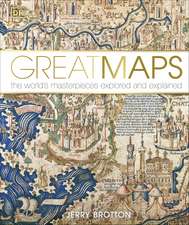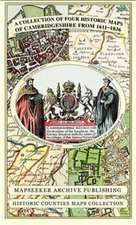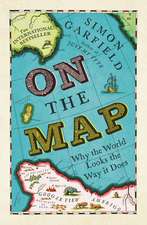The West Indies: Patterns of Development, Culture and Environmental Change since 1492: Cambridge Studies in Historical Geography, cartea 8
Autor David Wattsen Limba Engleză Paperback – 21 mar 1990
Din seria Cambridge Studies in Historical Geography
-
 Preț: 273.22 lei
Preț: 273.22 lei -
 Preț: 244.49 lei
Preț: 244.49 lei -
 Preț: 355.39 lei
Preț: 355.39 lei -
 Preț: 338.70 lei
Preț: 338.70 lei -
 Preț: 323.05 lei
Preț: 323.05 lei -
 Preț: 305.12 lei
Preț: 305.12 lei -
 Preț: 286.13 lei
Preț: 286.13 lei -
 Preț: 282.48 lei
Preț: 282.48 lei -
 Preț: 289.19 lei
Preț: 289.19 lei -
 Preț: 407.47 lei
Preț: 407.47 lei -
 Preț: 280.53 lei
Preț: 280.53 lei -
 Preț: 454.76 lei
Preț: 454.76 lei -
 Preț: 340.32 lei
Preț: 340.32 lei -
 Preț: 404.43 lei
Preț: 404.43 lei -
 Preț: 464.60 lei
Preț: 464.60 lei -
 Preț: 436.68 lei
Preț: 436.68 lei -
 Preț: 405.07 lei
Preț: 405.07 lei -
 Preț: 324.15 lei
Preț: 324.15 lei -
 Preț: 317.29 lei
Preț: 317.29 lei -
 Preț: 406.33 lei
Preț: 406.33 lei - 5%
 Preț: 405.43 lei
Preț: 405.43 lei -
 Preț: 288.09 lei
Preț: 288.09 lei -
 Preț: 387.35 lei
Preț: 387.35 lei -
 Preț: 321.52 lei
Preț: 321.52 lei -
 Preț: 189.72 lei
Preț: 189.72 lei -
 Preț: 349.62 lei
Preț: 349.62 lei -
 Preț: 434.01 lei
Preț: 434.01 lei -
 Preț: 316.90 lei
Preț: 316.90 lei -
 Preț: 452.26 lei
Preț: 452.26 lei -
 Preț: 401.28 lei
Preț: 401.28 lei -
 Preț: 338.33 lei
Preț: 338.33 lei
Preț: 444.74 lei
Preț vechi: 499.71 lei
-11% Nou
Puncte Express: 667
Preț estimativ în valută:
85.10€ • 88.85$ • 70.43£
85.10€ • 88.85$ • 70.43£
Carte tipărită la comandă
Livrare economică 05-19 aprilie
Preluare comenzi: 021 569.72.76
Specificații
ISBN-13: 9780521386517
ISBN-10: 0521386519
Pagini: 640
Ilustrații: 15 half-tones, 65 tables
Dimensiuni: 153 x 229 x 40 mm
Greutate: 1.01 kg
Ediția:Reprint
Editura: Cambridge University Press
Colecția Cambridge University Press
Seria Cambridge Studies in Historical Geography
Locul publicării:Cambridge, United Kingdom
ISBN-10: 0521386519
Pagini: 640
Ilustrații: 15 half-tones, 65 tables
Dimensiuni: 153 x 229 x 40 mm
Greutate: 1.01 kg
Ediția:Reprint
Editura: Cambridge University Press
Colecția Cambridge University Press
Seria Cambridge Studies in Historical Geography
Locul publicării:Cambridge, United Kingdom
Cuprins
List of illustrations; Preface; Notes and abbreviations; 1. The environment; 2. Aboriginal peoples: settlement and culture; 3. Spanish intrusion and colonisation; 4. Early northwest European plantations; 5. Northwest European sugar estates: the formative period, 1645 to 1665; 6. The extension of the West Indian sugar estate economy, 1665 to 1833: I General development and trade; 7. The extension of the West Indian sugar estate economy, 1665 to 1833: II Sugar production, regional population growth, and the slave-white ratios; 8. The extension of the West Indian sugar estate economy, 1665 to 1833: III Population: social characteristics, migration and the growth of towns; 9. The extension of the West Indian sugar estate economy, 1665 to 1833: IV Agricultural innovation and environmental change; 10. Post–1833 adjustments: the period to 1900; 11. Twentieth-century trends, and conclusions; Notes; References.
Recenzii
"A well-known British biographer has collected from original fieldwork and intensive library research a wide range of detailed historical and environmental material about the Caribbean islands, from their earliest occupation to the present. Inevitably, the principal theme is sugar and how it influenced not only the islands but the policies of the colonial powers for more than 300 years. Just as important are the consequences for each pristine island environment of introducing successions of foreign plants and animals. A nearly flawless text...is supplemented by a large number of well-constructed maps, tables, and model diagrams." Choice
"...[Watts] takes as his subject a region where the impact of Europeans on nature was particularly marked, both because they encountered a fragile ecology, and because at first they focused their rapaciousness on just a few islands. The resulting book, The West Indies, demonstrates impressively the potential of environmental history." Times Literary Supplement
"David Watts has managed to capture both the complexity and the simplicity of Caribbean development and weave them together in a remarkable study that covers the region as a whole over the entire span of its modern history." Dale W. Tomich, Forest & Conservation History
"...[Watts] takes as his subject a region where the impact of Europeans on nature was particularly marked, both because they encountered a fragile ecology, and because at first they focused their rapaciousness on just a few islands. The resulting book, The West Indies, demonstrates impressively the potential of environmental history." Times Literary Supplement
"David Watts has managed to capture both the complexity and the simplicity of Caribbean development and weave them together in a remarkable study that covers the region as a whole over the entire span of its modern history." Dale W. Tomich, Forest & Conservation History











